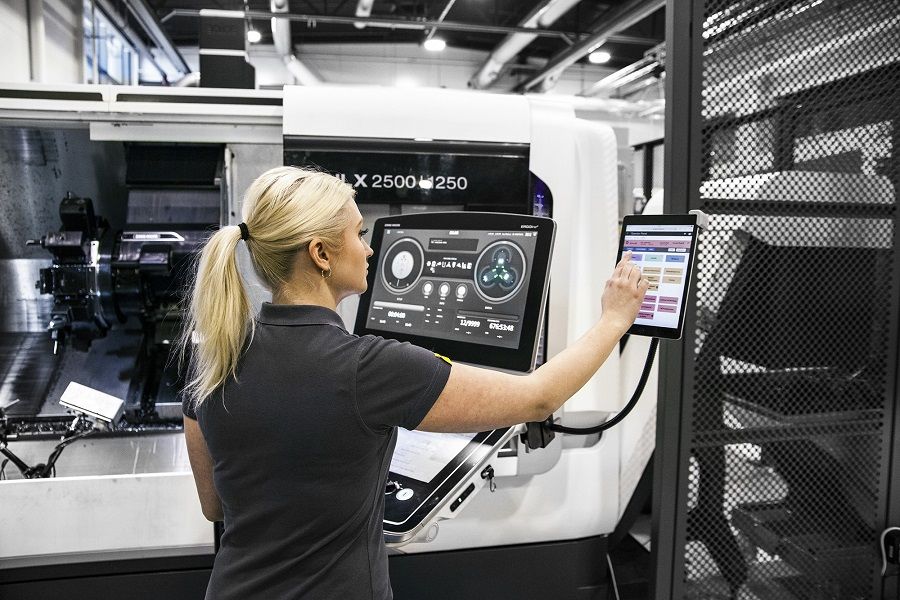Scrapping components are a factor that prevents a workshop from achieving top performance. Common situations that lead to scrapping include using the wrong tools, human errors in machine programming and undetected variations in the raw material that cause unpredictable machining issues. Moreover, waste has a serious impact on the environment if it isn’t recycled. In fact, World Bank estimates that waste produced by industry is 18 times more than solid waste produced by municipalities around the world.
If machine shops are to reduce scrap, they must implement the right tooling setup and cutting data. Failure to secure these factors can result in irregular tool wear and unpredictable insert tool life — this leads to component rejections and, in turn, scrap.
Tool choice is especially integral to reducing waste in turning, a common lathe machining operation. Efficient steel turning can be achieved by reducing scrap and component rejections, as part of an effective strategy to bring down the cost of production within an existing machining setup. The strategy might include maximizing machine use or selecting more reliable tooling solutions, like the insert, to reduce cost per part.
But what are the characteristics of a more reliable tool? Turning grades that provide long and predictable tool life, with good chip control, should be considered for secure and productive machining. Selecting a tool with longer life, combined with greater wear and heat resistance, can yield tangible benefits, like minimizing unplanned stops or reducing material waste from the workpiece material or from the carbide insert itself. These are all necessary preconditions for sustainable machining. Sandvik Coromant’s dedication to using recycled materials in our turning grades is also an important factor, in order to make our customer’s productions more sustainable. One of the criteria in our development project is to increase the use of recycled material while reducing waste.
Smoothing out the pain points
While awareness of sustainability is gaining momentum across virtually all industries, so too is digital transformation. In a survey of more than 400 global manufacturing companies, 94 percent of respondents indicated that Industry 4.0 has helped keep their operations running during the pandemic. The challenges of COVID-19 have also served as a wake-up call to manufacturers that are lagging behind in implementing Industry 4.0 strategies.
The advantages of Industry 4.0 for manufacturers are now well known — that it helps managers and workers make better-informed decisions, leads to greater productivity, can reduce production errors and supports higher profits. But a lesser realized benefit of Industry 4.0 is the crucial role it plays in sustainability.
Historically, plant managers have based machining decisions on the initiative and experience of their workers. Machines that are connected through the Internet of Things (IoT), on the other hand, can enhance the invaluable experience of human workers to offer new possibilities for transparency, optimized planning and streamlined production. With this in mind, there are a number of digital services today that can help manufacturers implement more sustainable production processes.
A good place to start in any sustainability strategy is to conduct an audit of a plant’s current status with data-led insights. This approach can identify several areas of inefficiency that might impede a machine shop’s productivity and sustainability. For instance, if a facility is experiencing premature tool wear, subpar surface finishes or high machine downtime, the data gathered through sensors can help operators make informed improvements to their machining process in ways that help reduce waste and increase energy efficiency.
As an example, the CoroPlus Productivity Improvement Program (PIP) is one solution to these pain points. The PIP is a proven, structured process that can be performed on a single machine, on a process chain or across the whole plant. To begin the process, Sandvik Coromant experts identify inefficiencies in production and, from there, Sandvik Coromant installs machine monitoring solutions that give data insights in real time. This data can be accessed remotely to provide an in-depth analysis of a complete production cell, right down to the cutting tool.
CoroPlus PIP can support manufacturers by lowering costs and reducing inefficiencies, but also helps make the manufacturing process more sustainable. By making sure machines run as efficiently as possible and cutting down machining time, the program can eliminate waste and reduce energy consumption. Not least, major assets — the people on site — will have better working conditions while knowing machine processes are smooth, stable and predictable.
A few misinformed decisions can be the difference between productive, sustainable metal cutting and a wasteful machining process. However, as we become more aware of the impact of metalworking on the environment, innovations are being realized that can significantly improve the industry’s credentials. That includes finding more sustainable ways of not just producing but also machining metals for people, planet and profit.
sandvik.coromant.com





